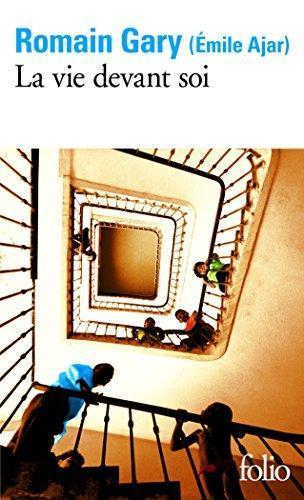Lulu/ Lucien reviewed La vie devant soi by Romain Gary
A really difficult and mixed read
3 stars
Book read as part of "common reading" for October 2023, at LucieBulle's book club. Warning : adult material. This novel was translated into English : The Life Before Us.
Paris, Belleville district, 1970s. Momo, aged ten, lives in a boarding house specially created for kids who were "born crooked", the words he uses for the children of prostitutes, at a time when this was so frowned upon, that public assistance would have intervened to remove all these children and place them elsewhere, especially since Ms. Rosa, the creator of this particular shelter, had also been a prostitute.
She is also a survivor of Auschwitz, and thus, Momo sees her prey to both her traumas, and her failing sick body - which pushes the doctor to want to have her hospitalized, against the wishes of Mrs. Rosa, who doesn't want not become a vegetable, forced to live.
Momo lacks neither philosophical …
Book read as part of "common reading" for October 2023, at LucieBulle's book club. Warning : adult material. This novel was translated into English : The Life Before Us.
Paris, Belleville district, 1970s. Momo, aged ten, lives in a boarding house specially created for kids who were "born crooked", the words he uses for the children of prostitutes, at a time when this was so frowned upon, that public assistance would have intervened to remove all these children and place them elsewhere, especially since Ms. Rosa, the creator of this particular shelter, had also been a prostitute.
She is also a survivor of Auschwitz, and thus, Momo sees her prey to both her traumas, and her failing sick body - which pushes the doctor to want to have her hospitalized, against the wishes of Mrs. Rosa, who doesn't want not become a vegetable, forced to live.
Momo lacks neither philosophical vision, from his young age but his 'great experience', nor humor; However, despite long passages that are very pleasant, even funny, to read, his views of life and the multitude of people, religious and/or cultural barriers, but also the acceptance of different people, depending on the case, there also has passages that are very difficult to read: whether these are actions that Momo did to receive attention, or to take care of the other, younger children, or of Mrs. Rosa, the common point is a number of triggers of the scatophobia (also known as coprophobia), and for me, the complication of emetophobia that comes with it.
So, I had to read it away from meals, and rush through those personally difficult moments to swallow with my eyes. On the other hand, the narrative style, often with very crude dialogue; the built suspense, a child's unique view of the world and the people around him are all well portrayed. Also, the author, via Momo, rather takes the positive side of accepting people who are often marginalized: prostitutes, but also homosexuals and Trans people - but given that the character in the novel is in transition and 'transvestite' I assumes that the term Trans did not exist at the time Gary/Ajar wrote and published this novel.
Certainly, certain words sometimes come back often, while our author with 7 names was able to find original ways to vary and avoid it, this didn't really bother me, given that the narrator is a child. On the other hand, I don't know if children Momo's age would have used certain more complex words, several seemed out of character to me.
I also have some doubts about the approach to obesity: that of Mrs. Rosa is very regularly repeated and sometimes I have the feeling that it was done with denigration, while others that doesn't sound like it to me at all, so it's hard for me to decide.
I wanted to like this novel more than my 5/10, but I have to face the facts: I had too much trouble reading it, and although I liked the ending (very sad, but at the same time fair), I cannot give it any further credit. This novel, as a whole, is well outside my literary habits and comfort zones, it has at least these merits.



